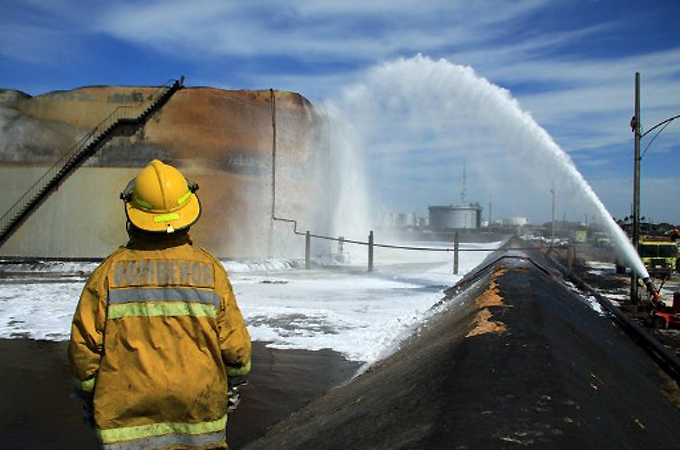
Workers have resumed operations at Venezuela's biggest refinery, a week after an explosion that killed 42 people, the state-owned oil company PDVSA said.
"Operational activities have resumed safely and gradually," said Jesus Luongo, a PDVSA director who heads the Paraguana refining complex, noting that the refinery was ramping up output, initially processing 160,000 barrels on Friday.
Firefighters struggled for days to put out the blaze triggered by a gas leak at the Amuay refinery, which produces 645,000 barrels per day at normal capacity.
At least 20 members of a national guard unit assigned to protect the facility were killed, along with some members of their families, and about 500 homes were damaged in the blaze.
The refinery is located in a residential and commercial complex where workers live with their relatives and poor families who settled in surrounding neighbourhoods.
The accident was the worst in the history of the oil industry in Venezuela, which has the largest oil reserves in the world. Its reserves, which the government estimates at 297.57 billion barrels, surpass those of Saudi Arabia, which has the biggest refining capacity.
Refinery failures
The disaster has prompted questions about whether Petroleos de Venezuela SA has neglected maintenance while funneling its revenues into social programmes run by President Hugo Chavez's socialist government.
A document published on Thursday by two national Venezuelan newspapers said that months before the explosion, a study by engineers had found failures in the complex's maintenance and listed dozens of accidents.
The report was prepared in March by RJG Risk Engineering for the international insurance company QBE.
The study said there had been 222 accidents at the Paraguana Refining Center last year. It said 100 of those involved fires, and 60 were breaks and leaks in pipes that carry combustible liquids.
Critics have said that in addition to refinery failures from delayed maintenance, PDVSA's operations have also suffered from the firing of nearly 18,000 oil workers in 2003, about 45 per cent of the payroll, after they joined a strike called by Chavez's political opponents to press demands that the president resign.
In recent years, Chavez's government has increasingly used a share of earnings from PDVSA to fund social programmes known as "missions". Its contributions to such programmes rose from less than $1.6bn in 2004 to $10.4bn last year.
Oil Minister Rafael Ramirez has said Venezuela has plenty of fuel on hand to meet domestic demand in the aftermath of the disaster and will not have to increase imports, but he has not discussed the possible financial impacts for the state oil company.
No comments:
Post a Comment